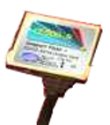CF serial card supplies 5VDC to peripherals
Nov 28, 2007 — by LinuxDevices Staff — from the LinuxDevices Archive — 1 views U.K.-based Elan Digital has announced a card that can add an RS-232 serial port to any Linux device that has a CompactFlash slot. The CF500 is ideal for interfacing PDAs and other devices to peripherals such as barcode scanners and fingerprint readers, according to the company.
U.K.-based Elan Digital has announced a card that can add an RS-232 serial port to any Linux device that has a CompactFlash slot. The CF500 is ideal for interfacing PDAs and other devices to peripherals such as barcode scanners and fingerprint readers, according to the company.
Elan says PDAs and other portable devices typically only supply 3.3V — insufficient to power many peripherals — through their CompactFlash bus. The CF500 incorporates a DC to DC converter, and can output 5VDC regardless of what input voltage it receives, the company claims.
Touting the card's low power consumption, Elan rates its maximum DC power output at 100mA at 5V, host permitting. Corresponding power consumption is 140mA when the host supplies 5V, or 200mA if the host is supplying 3.3V.
The card incorporates a 16C550 UART with 16-byte TX and RX FIFOs for high speed and reliable communications. A hardware-switchable baud rate multiplier allows industry standard rates up to 115 Kbps in x1 mode, or up to 921 Kbps in x8 mode, the company says.
Hot-swappable, the CF500 is supported by standard drivers in Linux, according to Elan. The card is also said to be compatible with most other OSes, including Windows XP and XP Embedded, Windows 2000, and Windows 95/98.
The card is supplied with an 11 inch cable, one end of which latches into the CF card. The other end features a male DB9 connector, with female screwlocks and an RS-232 pinout. A variety of custom cables can be supplied for specialized OEM applications, the company said.
Elan notes that the CF300 can also be used in laptops and other systems with PCMCIA interfaces, via a CF card adapter.
Pricing was not released, but the card is currently sampling, according to the company.
This article was originally published on LinuxDevices.com and has been donated to the open source community by QuinStreet Inc. Please visit LinuxToday.com for up-to-date news and articles about Linux and open source.